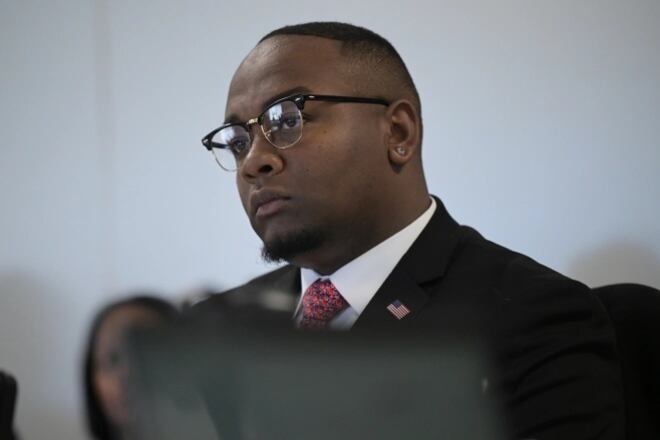Denver school board Vice President Auon’tai Anderson is dropping his re-election bid and will run instead for a seat in the Colorado House of Representatives.
The 24-year-old is the most high-profile member of the Denver school board, and his exit from the race will mean a change in the dynamics of the board, which has been criticized for infighting, including between Anderson and President Xóchitl “Sochi” Gaytán.
“The Anderson era of the school board has been consequential and we’ve made a lot of progress,” Anderson said in an interview. “But it’s also an opportunity to go back to being boring. You won’t have a lightning rod of one person of seven being outspoken on the school board.”
Anderson was elected in 2019 to an at-large seat representing the entire city as part of a historic “flip” of the school board to members backed by the teachers union. His four-year term ends in November. Anderson had announced more than six months ago that he was running for re-election to the board. Two other candidates — Kwame Spearman and Paul Ballenger — announced this spring that they would challenge him for the seat.
But on Monday, Anderson said he plans instead to run for the House District 8 seat representing northeast Denver in 2024. The seat is held by state Rep. Leslie Herod, a Democrat who is barred from running again due to term limits. Four other candidates have already filed to run for the seat, according to the secretary of state’s office database.
Other politicians have simultaneously served in the state legislature and on local school boards, including in Denver, but Anderson said the timing of the races would have made that difficult.
In the wake of a shooting inside East High School in March, Anderson said he began thinking about the limitations of the school board to make broad political changes. For instance, Anderson said the school board can’t enact gun control measures, while state lawmakers can. He recalled a conversation he said he had with a Black mother and student.
“The student said, ‘You’re telling us everything you can’t do. What are you going to do about it?’” Anderson said. That conversation helped push him to run for the legislature, he said, where he hopes to advocate for gun safety, rent control, and reproductive rights, among other issues.
In a campaign video, Anderson said he accomplished everything he set out to do on the school board, a claim he repeated in an interview. In the video, he listed reunifying Montbello and West high schools — two schools in communities of color that the district previously closed for low student test scores. West High reopened in 2021, and Montbello High reopened last year.
Anderson mentioned raising the minimum wage for district employees to $20 an hour, stocking school bathrooms with free menstrual hygiene products, and passing policies inclusive of LGBTQIA students, such as mandating all-gender restrooms — all of which he championed.
“I am walking away with my head held high,” Anderson said in an interview. “Even if I am never elected to another seat in government again, I’m walking away having no regrets.”
Anderson also helped lead the push in 2020 to remove police officers from Denver schools following the murder of George Floyd in Minneapolis. But the future of that policy is uncertain. The board voted to temporarily suspend it after the East shooting, and some board members now want to bring school resource officers back more permanently.
Board members Michelle Quattlebaum and Scott Esserman have joined Anderson in publicly opposing the return of SROs. Anderson said he’s confident that Quattlebaum, Esserman, and others will “keep that work going” after he leaves the board.
A poll taken in April before other candidates had declared found just 9% of respondents said they planned to vote to re-elect Anderson and more than half said it was “time for someone new.” A third of respondents were undecided.
Anderson’s time on the school board has been controversial. In 2021, his fellow board members censured him for violating expectations of board member behavior.
The censure came after a five-month investigation into sexual assault and misconduct allegations, the most serious of which were not substantiated. But investigators did find that Anderson had flirtatious contact with a student while he was a board member and made social media posts that were coercive and intimidating toward witnesses during the investigation.
“Leadership always comes with bumps, and people make mistakes,” Anderson said. “But it’s about how we learn from those mistakes and keep moving the mantle forward.”
This will be the third time Anderson has run for office. A graduate of Denver’s Manual High School, Anderson first ran for school board in 2017 when he was just a teenager. Though he lost that race, he ran again two years later and won.
In announcing his now-canceled re-election bid last November, Anderson said he’d considered running for a seat on the Denver City Council but changed his mind after the board’s debate last fall on whether to close schools with low enrollment.
Superintendent Alex Marrero initially recommended closing 10 small schools. Anderson was a vocal opponent of that plan, which Marrero whittled down and the board rejected.
But four months later, in March, the board came back and voted to close three of the 10 schools. Anderson voted to close Math and Science Leadership Academy and Denver Discovery School, however, he cast the sole vote against closing Fairview Elementary, where enrollment projections were in dispute.
Declining enrollment and school closures will be among the issues the next school board will need to tackle, and Anderson left open the possibility that he could run for the board again someday. But he also said that this coming election, when three of the seven seats are up for grabs, “is an opportunity for us to hit a good restart.”
Melanie Asmar is a senior reporter for Chalkbeat Colorado, covering Denver Public Schools. Contact Melanie at masmar@chalkbeat.org.





